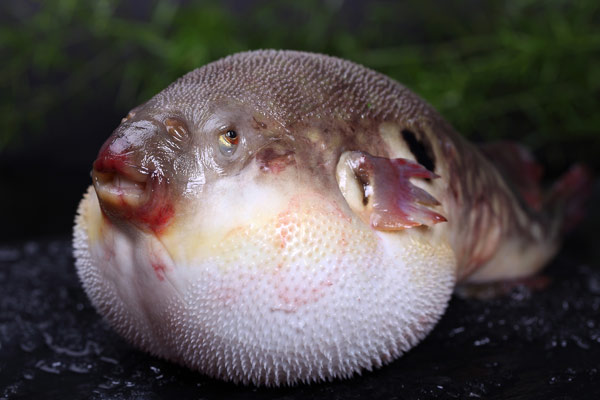 |
|
Fresh puffer fish, a delicacy for Chinese diners. [Photo by Zhang Zhuojun/For China Daily] |
China looks set to scrap a 26-year ban on the sale of puffer fish on the mainland.
The poisonous yet tasty delicacy was ordered off the menu by health authorities in 1990, while the China Food and Drug Administration has twice sent notices reminding restaurants of the rules in recent years.
However, members of the China Fisheries Association and China Aquatic Products Processing and Marketing Association met recently to discuss allowing certified companies to sell puffer fish products. It is not known when the ban may be lifted.
The move will be welcome news to those in the food industry, even though the ban has been largely ignored in many areas of the country, including in Shanghai and Jiangsu province, where companies have continued to sell the fish to restaurants, which in turn offer them discreetly to their diners.
Sa Long, a chef who specializes in preparing puffer fish in Zhenjiang, Jiangsu, said his restaurant has never stopped offering the fish due to the huge demand.
"The puffer fish provided by farms are much less poisonous than wild ones," Sa said. "But the fish still needs to be prepared by a trained chef because the toxin in its blood, ovaries and other parts can kill humans easily. We've never had any poisoned diners."
According to Beijing News, about 30,000 to 50,000 metric tons of puffer fish are sold in China every year, with the output value reaching 10 billion yuan ($1.5 billion). About 200,000 people are involved in China's puffer fish industry, the paper said.
Cai Ping, executive director of the Jiangsu office of tje Asia Puffer Fish Cultural Research Association, said his group trains thousands of chefs to process the fish every year.
"There are strict regulations," Cai said. "The chefs used to have the cooked fish first and serve it to the customers 20 minutes later, after it was proved to be safe.
"Many Chinese regions have the tradition of eating puffer fish. The lifting of the ban will help boost the industry."
